Predictions are for suckers. The trick to understanding the future isn’t trying to guess the answers, it’s knowing which questions to ask.
If only we always did. But for the last of this week’s new-year posts, let’s try.
Here’s a list of questions about Portland biking that will (we think) be answered by the year to come.
Bike sharing
1) Will the city’s bikesharing sponsor get to pick the system’s name, or just put their logo on everything?
2) How many retailers will panic about bikesharing stations removing nearby parking spaces — and how much will the city be willing to negotiate with them?
3) Will bikesharing launch in time for the World Naked Bike Ride, and if so, how many bottles of bleach spray will be deployed the next morning?
Big projects
4) Will Portland find a bidder for the delayed 50s bikeway this winter? If it doesn’t, will it put more money into the job, or scale the plan back?
5) Will the city’s preferred option for the 20s bikeway focus on calming traffic, on separating lanes, or on diverting bikes?
6) How much money will Portland be willing to dedicate to a new downtown protected bike lane network? Will the city council be willing to improve biking on streets that actually access popular destinations? Which bridge landings will be improved, and which won’t?
7) Which will Portland decide is more important: allowing a continuous bike lane on Foster Road, or preserving one block of auto parking?
Really big projects
7) Will Gov. Kitzhaber and Speaker Kotek successfully push an Oregon-only Columbia River Crossing freeway-rail project through the February 2014 legislative session?
8) Will Tigard voters throw a wrench in Metro’s plan to rebuild Barbur Boulevard by passing an anti-transit ballot issue in March? In either case, will the City of Portland push ODOT to look more closely at ways to make the street safer sooner?
9) What will TriMet decide, in late spring, to call its new bridge? (Simpson? Toulan?)
City politics
10) Will the Portland Bureau of Transportation get the Portland Business Alliance (the regional chamber of commerce) to sign off on a plan for a per-month street fee to improve local transportation?
11) Which big projects will the Bicycle Transportation Alliance ask for in exchange for their support of a street fee — and will they get what they want?
12) Will Commissioner Amanda Fritz act to adjust bike access to Forest Park?
13) What positions will Commissioners Nick Fish and Dan Saltzman take on transportation and land use during their reelection campaigns? Will they get challengers?
The burbs
14) Will enough Tillamook and western Washington County residents get excited this spring about a Salmonberry Corridor path through the coast range to convince their politicians to prioritize it in Salem in 2015?
15) Will enough Washington County residents urge the county to stop paving itself over for leaders to think beyond the car with their new transportation plan?
16) Will the state legislators decide to jump into the local land-use business and expand Washington County’s urban growth boundary?
17) Who will Clark County’s new set of radically car-oriented commissioners hire to run their roads department, and how will the new hire change the county’s priorities?
Local bike business and culture
18) Will Portland bike component builders follow their congressman’s cue and take a new pass at creating a local trade association?
19) Will Alta Bicycle Share’s new management team keep scoring more big municipal contracts (Philadelphia, Atlanta, maybe even Toronto) or shift gears toward maintaining and expanding the systems they already have? Will their equipment supplier, PBSC, stay in business?
20) Will the city’s bike shop growth resume, or stay flat?
21) Will new volunteers join Pedalpalooza’s old guard of organizers? If they do, will they try any big new ideas?
22) Will the Rev. Phil Sano’s wang once again make it onto the front page of BikePortland? (Just kidding.)
Trends and milestones
23) Will Bicycling Magazine’s biannual rankings tap Portland as the country’s best bike city, as usual, this spring, or give the honor to a new upstart like Seattle or New York?
24) Will the no-auto-parking apartments now opening in Portland’s central city actually fill up? If they do, how many of their residents will own cars?
25) When new city and Census estimates come out in the fall, will the city’s bike commuting ratio start to climb again?
26) Will Multnomah County’s job growth rate exceed Washington County’s for the first time in forever?
27) Will this be the first time since 1999 when Portland goes two straight years without a single bike-related fatality?
Think you know some of the answers — or some better questions? Give it a shot, sucker.



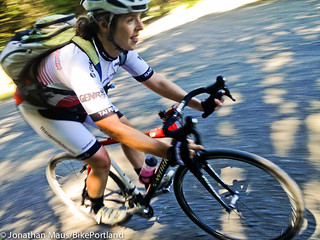
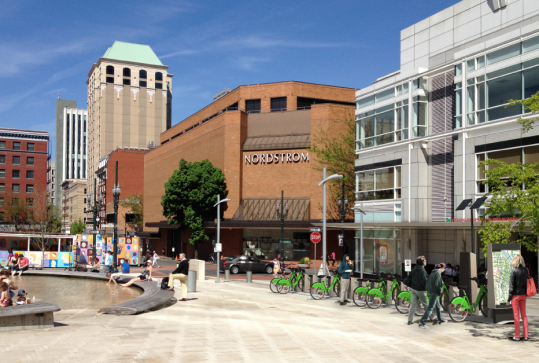

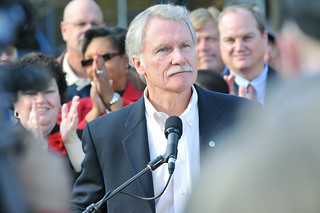

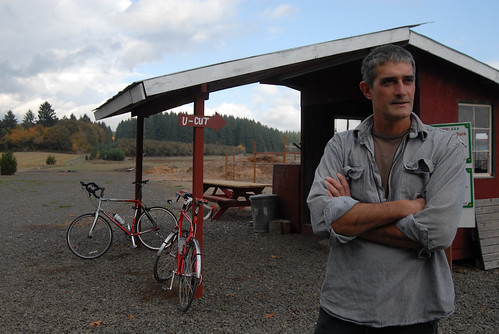
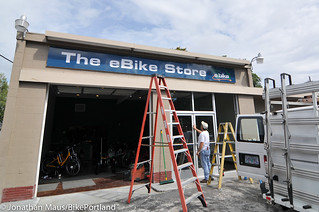
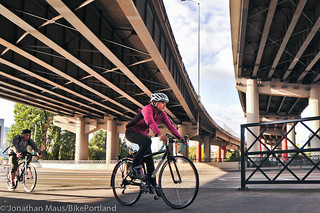
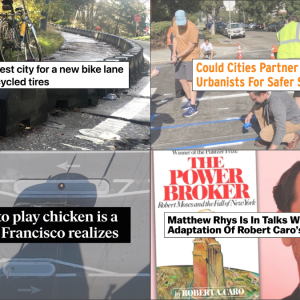
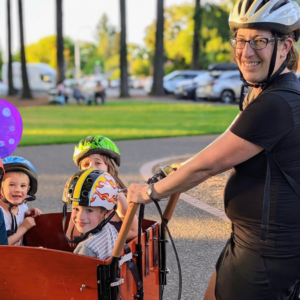

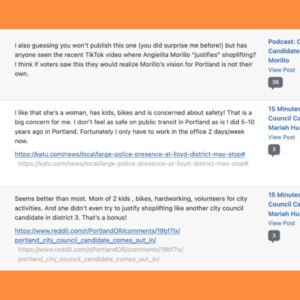
Thanks for reading.
BikePortland has served this community with independent community journalism since 2005. We rely on subscriptions from readers like you to survive. Your financial support is vital in keeping this valuable resource alive and well.
Please subscribe today to strengthen and expand our work.
I think a compelling question might be:
in a bid to make our roads safer, will the city or state do anything to ban the use of electronic devices while driving? Will local authorities enforce such a law?
New law bumps the penalty up to $500. Of course with no enforcement the practice of distracted driving is essentially permitted.
Or a better question. Will the legislature allot money to hire more Law Enforcement Officers to help enforce the laws it passes?
Oh c’mon… The workflow here is not “pass a law, hire enough police to catch everybody breaking it.” The real process is “pass a law, public complies to the law, existing police catch remaining scofflaws.”
My point is: it is the public that is totally screwing up here by disregarding the law in mass. I don’t blame the police for this situation.
And my solution: Bigger fines. I want teenagers saying “My buddy got $2,000 fine for texting and had to mow lawns all summer – no way I am doing that.”
Thank you, you seem to be one of the only people here who realize it is still part of the community’s role to obey by the laws, not just disobey them and then whine about getting caught because it is not your duty to follow or know that you were caught it is just some stupid law. The same can be said for each law out there, heck if they were obeyed then more police wouldn’t need to be employed and that money could go elsewhere to help the city.
“My point is: it is the public that is totally screwing up here by disregarding the law in mass. I don’t blame the police for this situation.”
It is not that simple.
(A) Let’s take speed limits. We had a National Maximum Speed Law (NMSL) of 55mph from ’74-’88. Fewer deaths, less gasoline use. But apparently really iffy enforcement. Then some idiot (Clinton) decided to raise the speed limit. What kind of signal is that? Oh, everyone has started drifting a little past the 55, is going 60 most of the time, so let’s raise the speed limit… What the hell? Then in ’95 the NMSL was abandoned altogether.
(B) Let’s take enforcement. Our police could enforce many laws related to how people drive. Which do they choose to enforce? Oh, yeah, stings in Ladd’s Addition. It is a dance; a dance between various branches of the government and the public.
“And my solution: Bigger fines. I want teenagers saying “My buddy got $2,000 fine for texting and had to mow lawns all summer – no way I am doing that.”
Absolutely. I agree 100%
You’ve both got me thinking, and I want to refine my point.
It is the public’s job to act civil. That means not texting/speeding because it is dangerous, not because it is against the law. It is a major civility failure that necessitates laws against speeding, laws against drunk driving, and laws against texting (finally).
There’s also a law requiring ducks to wear long pants.
I have to ask about your #11 (or perhaps this was the joker)?
11) Which big projects will the Bicycle Transportation Alliance ask for in exchange for their support of a street fee — and will they get what they want?
Is this really true?! If so can we learn more about their thinking?
The joker is the Rev. Phil. 🙂 I’m not actually certain that the BTA will offer to support a street fee. It’s just a guess that there’ll be a very active conversation on this. But they did in 2007, on the grounds that the city does actually need the money and would use it for good. That support was built on a relationship with Transportation Commissioner Sam Adams when he was at his bikiest, of course.
Regarding #12, I am not feeling very optimistic that things will improve in the Portland metro area with regards to off-road riding. Mountain bikers (including our children) will continue to have to get into cars to ride their bikes on good trails/dirt jumps. It blows me away that there isn’t a single legal dirt jump in the entire area. We need as many people as possible to show up at the Parks Budget Dialogue. The meeting is on Wednesday, January 8th from 6-8pm at St. Philip Neri Church, Carvlin Hall, 2408 SE 16th St. I recommend that we all wear or carry our helmets so our numbers are recognized.
Support Gateway Green:
http://www.gatewaygreenpdx.org/
There’s no way that the current allowable access in Forest Park is used by bikers who exclusively ride their bikes to get there. Many, many drive cars to ride the trails. More access in Forest Park is not going to change that, cyclists will still drive to trail heads. Don’t conflate more access with less driving.
If we have multiple accessible parks in the city than it will help some of this.
There might be no way that every single cyclist in Forest Park rode there, but they will make up a pretty strong majority (over 90%?). It’s not exactly a huge destination for riding that would entice large numbers to drive there to cycle.
My point was meant to be an absolute for all mountain bikers.
A ten minute drive is a lot less driving than a 60 minute drive. I, and many others, ride to Forest Park and Powell Butte to ride. I would do so more often if the trails were better, and forego the drive to other trails. Better trails in the city will mean less driving. I stand by my assertion.
My point was “not” meant to be an absolute for all mountain bikers.
In this regard, little ole Cascade Locks should be a role model for P-town…
will the Oregonian, when breathlessly reporting the huge expense of a non-motorized transit project, put the cost in context with all transit projects?
“…15) Will enough Washington County residents urge the county to stop paving itself over for leaders to consider the notion with their new transportation plan? …” andersen/bikeportland
You may want to rephrase the question. Could just be me, but I’m having difficulty understanding exactly what’s being asked.
As far as the talked about Westside Bypass proposal is concerned, construction of it would be a countryside killer, detrimental to quality of life derived from the relatively rural setting that still makes up much of Washington County. People that want to continue to reside where the countryside is close at hand, or relatively so, should resist temptation to approve construction of another asphalt gash through the land.
In conceiving or co-ordinating land and community development with an efficient transportation plan, the county’s efforts have much to be desired. The currently in planning phase, South Cooper Mtn development, is an example. In consuming presently undeveloped countryside, it’s location will be farther from employment such as Intel and Nike, than most people would ever consider biking, let alone walking. Roads adjoining the development site, are insufficient for current levels of traffic, so there’s no way they’ll be able to handle traffic arising from travel needs of residents of the new development.
You’re probably right about the phrasing. Changed.
Michael…much better phrasing, resulting in a much better question.
So far, in reading the news and listening for scuttlebutt, I haven’t seen much indication that county officials consider biking infrastructure to be more than a hopefully attractive perk to people thinking of coming to work at some of the employment centers in the county.
It would be great if they felt compelled to at least make a request to planners and developers that they draw up some proposals with infrastructure that says: ‘With a neighborhood based on our design, you could ride safely and enjoyably from your home to work, or the store, or your church, school, etc, in 10-20 minutes.’.
Washington County officials have had opportunities to do this over the last couple decades, but instead, the effort towards designing and creating infrastructure has been overwhelmingly, with significantly negative consequences, in support of enabling the use of ever greater numbers of motor vehicles.
As for your Clark County new item…the replacement for Pete Capell, the long time Public Works Director, will likely not make or break bike and ped projects here…assuming the County Commissioners utilize a nationwide hiring process through HR or a private head hunter.
The County, as most counties do, gets a lot of its road funds from state gas taxes (vs. Cities) and very heavily relies on residential development to arterialize its rural roadway network. These projects are effected by state concurrency rules and so there will be basic half street improvements…so on a project by project basis things will be the same…unless the street standards are radically changed or the 9th Circuit Court of Appeals changes its view of the ADA. Though the land use and regional multimodal network may suffer in the long term…only time will tell.
Your Clark County news item did miss a potentially more important job change…
Matt Ransom, former Transportation Planning Manager at the City of Vancouver, will be the new Executive Director at the SW Washington Regional Transportation Council. RTC is our federally mandated Metropolitan Planning Organization (MPO) for the 3 counties of Clark, Skamania and Klickitat. Same basic role as METRO but with a lot narrower…traditional scope. Matt’s RTC may grow into a more multi modally balanced MPO…with CTR, bike, ped and transit taking on more key role vs. RTCs past 1990 flavour…this assumes the RTC Board allows this course to be charted and implemented effectively over the long term within its mission statement. The RTC board has many of the same players as the CTRAN Board.
http://www.rtc.wa.gov/agency/#MPO
Good addition, Todd. I had a bit of contact at the Columbian with Ransom and he seemed like a relatively progressive guy.
I’d rephrase this: “How many retailers will panic about bikesharing stations removing nearby parking spaces”? as those are still parking spaces. Folks are just parking something other than a car.
“How many retailers will panic about replacing car parking spaces with much higher capacity bike parking spaces?”
Too true – we see it consistently with bike corrals whereby the conversion is good for business. There are many reasons – my favorite being that a sense of ‘place’ is created, something auto parking never does.